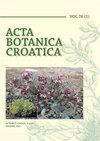不同剂量硫酸锌作用下蜡样芽孢杆菌对玉米的反应
IF 0.7
4区 生物学
Q3 PLANT SCIENCES
引用次数: 0
摘要
人为活动给环境增加了大量的重金属。重金属污染物影响土壤的生理和生物特性以及植物健康。锌(Zn)是一种必需的微量营养素,它促进植物的生长和发育,但较高浓度的金属会导致植物生长减少。本研究旨在评估在盆栽试验条件下,在土壤中添加不同浓度的ZnSO4(20、40和60 mg kg–1)时,蜡样芽孢杆菌对玉米植株的反应。实验采用完全随机设计(CRD)进行,共三次重复。较高剂量的ZnSO4抑制玉米生长和养分吸收。然而,用20 mg kg–1浓度的ZnSO4接种玉米种子的蜡状芽孢杆菌可使种子发芽率提高约39%,株高提高15%。此外,在20 mg kg–1浓度的ZnSO4下,与对照相比,观察到叶片长度增加17%,叶片数量增加7%。使用60 mg kg–1浓度的ZnSO4可观察到所有生长参数的降低。与在不同锌浓度下接种和生长的处理相比,处理T8(含有60 mg kg–1浓度ZnSO4的未接种种子)的锌吸收量高75%。结果表明,蜡状芽孢杆菌具有很好的修复土壤锌的潜力,并能降低锌的植物有效性和毒性。本文章由计算机程序翻译,如有差异,请以英文原文为准。
Response of Bacillus cereus on Zea mays under different doses of zinc sulphate
Anthropogenic activities have added a large amount of heavy metals to the environment. Heavy metal contaminants affect the physiological and biological properties of soil and plant health. Zinc (Zn) is an essential micronutrient and it promotes plant growth and development but
a higher concentration of the metal causes reduction in plant growth. The present study was aimed to evaluate the response of Bacillus cereus on maize plants at different concentrations of ZnSO4 (20, 40 and 60 mg kg–1) amended in the soil under pot experiment conditions. The experiment was conducted by using complete randomized design (CRD) with three replications. Higher doses of ZnSO4 inhibited maize growth and nutrient uptake. However, inoculation of maize seeds with Bacillus cereus at 20 mg kg–1 concentration of ZnSO4 increased seed germination about 39% and plant height by 15%. Moreover, 17% increase in leaf length
and a 7% increase in leaf number were observed as compared to control at 20 mg kg–1 concentrations of ZnSO4. Reductions in all growth parameters were observed with 60 mg kg–1 concentration of ZnSO4. The Zn uptake was 75% higher in treatment T8 (uninoculated seeds with 60 mg kg–1 concentration of ZnSO4) as compared to treatments which were inoculated and grown under different zinc concentrations. The results suggest that Bacillus cereus has good potential to remediate Zn from soil as well as to reduce the phyto-availibility and phytotoxicity of zinc.
求助全文
通过发布文献求助,成功后即可免费获取论文全文。
去求助
来源期刊

Acta Botanica Croatica
PLANT SCIENCES-
CiteScore
2.50
自引率
0.00%
发文量
34
审稿时长
>12 weeks
期刊介绍:
The interest of the journal is field (terrestrial and aquatic) and experimental botany (including microorganisms, plant viruses, bacteria, unicellular algae), from subcellular level to ecosystems. The attention of the Journal is aimed to the research of karstic areas of the southern Europe, karstic waters and the Adriatic Sea (Mediterranean).
 求助内容:
求助内容: 应助结果提醒方式:
应助结果提醒方式:


